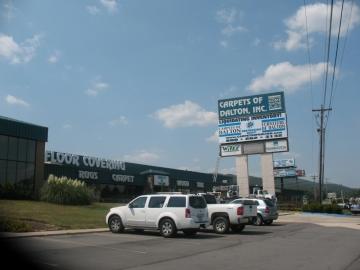
Section Branding
Header Content
How Does Georgia Diversify Our Economy?
Primary Content

The news of apparent recovery has come frequently from northwest Georgia’s flooring industry in recent months.
Announcements of new plants and expansions of current facilities eventually will add up to nearly 3,000 new jobs in a region devastated during the recession as the flooring industry collapsed. By some measures, the carpet capital of the world – Dalton and the surrounding areas – lost 17,000 jobs over the last decade.
“I think the lesson to be learned is that, first of all, we always have to look out for our own existing industries,” said Tom Croteau, deputy commissioner of global commerce at the Georgia Department of Economic Development. “We’re meeting with them to try to understand, what are their challenges? What are their opportunities to grow? When they do have an opportunity to expand, oftentimes, they’re competing against a sister plant -- maybe in the Midwest, maybe in Mexico – and we’re trying to understand, what are those things that are going to help them win that new business within their own company?”
Croteau said two-thirds of the announcements the department makes about new plants or expansions these days comes from businesses that already have Georgia operations. Those account for just 50 percent to 60 percent of the new jobs, however.
“The new companies coming in do get more media attention,” Croteau said. “Part of that is because those announcements may be bigger. When you’re building a new plant versus adding onto a new plant, the investment’s going to be larger.”
In northwest Georgia, the economy remains heavily reliant on flooring, though Croteau said it is more diverse now than it used to be. He said the state economic development arm focuses more on diversifying Georgia’s overall economy rather than looking locally or regionally.
“I don’t know that we look at it in terms of, ‘Hey, we have to take this region and try and diversify that region because it’s too dependent on one thing,’” Croteau said. “We try to make sure we’re touching enough various industries in what we do to make sure that we’re looking for opportunities across the board, that we’re recruiting industries in every sector.”
Croteau said there’s no perfect mix of industry for a region’s economy, and what the mix looks like depends heavily on the characteristics of the area. Metro Atlanta, for example, is a large area with a big airport. So that means more office space and office jobs as well as more international companies.
“However, I will say that we always are making sure that we pay attention to our manufacturing base, because so many feed off of that manufacturing base,” he said. “Suppliers and all the trickle-down effect into the service industries often comes from that manufacturing base.”
Croteau said the state also focuses on higher-paying industries and technically advanced jobs, like life sciences and biosciences.
“We’re always looking to raise the type of jobs we’re bringing into Georgia, not only in pay, but in the skills that are required,” he said.
Tags: economic development, jobs, carpet industry, Georgia economy, Georgia economic development, carpet manufacturer, Georgia Department of Economic Development, flooring industry, carpet capital, Carpet Industry jobs, flooring jobs, tom croteau
